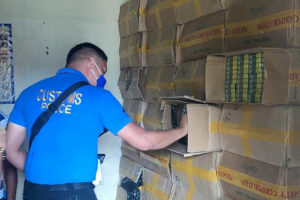THE impending economic sabotage bill is expected to help the government minimize lost revenue from tobacco smuggling, cigarette maker JTI Philippines said.
“We are looking forward to its full implementation. The crime of tobacco smuggling is indeed an act of economic sabotage because, put simply, it robs the nation’s coffers,” JTI General Manager John Freda said in a statement.
“Not only does it deprive government of much needed tax revenue but illegal trade cheats everyone: society, consumers and legitimate businesses,” he said.
Last month, the bicameral conference committee report on the Anti-Agricultural Economic Sabotage bill was ratified.
It seeks to repeal Republic Act No. 10845 or the Anti-Agricultural Smuggling Act. It will also introduce stiffer penalties for smuggling, hoarding, profiteering, and cartel-like behavior in regard to agricultural and fisheries products.
Mr. Freda said the illicit tobacco trade is “growing at alarming levels” and threatens the economy, particularly agriculture.
The Bureau of Internal Revenue (BIR) estimates that the government lost P25.5 billion in taxes from illicit tobacco last year.
This year, the BIR is hoping to collect P324.56 billion in excise taxes, with tobacco products being counted on to generate P152.4 billion.
The tobacco industry has so far contributed around P46.69 billion to the excise tax collections as of April 2024.
Mr. Freda said that the impact of tobacco smuggling extends to farmers, local government units, retailers and consumers, and revenue collection agencies.
The proceeds from the illicit trade also “often finance much larger criminal activities such as corruption, the smuggling of drugs and weapons, human trafficking and terrorism.”
Mr. Freda said that once the bill is signed into law, it will “send a strong message to smugglers and their accomplices of the government’s serious commitment to address the worsening problem of illicit trade in tobacco.”
“Once the law is ready for full implementation by the mandated agencies, the government has an additional potent weapon in its arsenal to wage war against smuggling syndicates.” — Luisa Maria Jacinta C. Jocson
